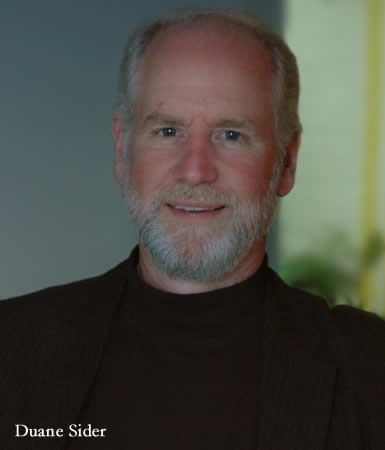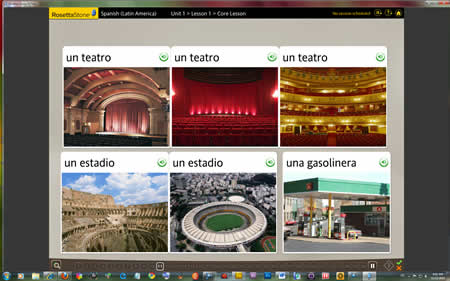 Duane Sider, director of learning for Rosetta Stone Ltd., is passionate about changing the way the world views language-learning. In his role, Duane has introduced Rosetta Stone solutions and the joy of the language-learning journey to a variety of audiences through numerous speaking engagements nationwide. Additionally, Duane has authored a number of articles and theory papers on immersion methodology in second-language acquisition.
Duane Sider, director of learning for Rosetta Stone Ltd., is passionate about changing the way the world views language-learning. In his role, Duane has introduced Rosetta Stone solutions and the joy of the language-learning journey to a variety of audiences through numerous speaking engagements nationwide. Additionally, Duane has authored a number of articles and theory papers on immersion methodology in second-language acquisition.
Duane joined Rosetta Stone’s international operations in 1997, became director of learning in 2003, directing domestic and international training programs, and assumed his current responsibilities in 2008. Prior to joining Rosetta Stone, he taught literature, religion and aesthetics at the university level for 14 years.
Duane has traveled, performed and taught extensively throughout the Americas, Europe and Asia, promoting international communication and advocating new education technologies. Duane holds a Bachelor of Arts degree in biology from Messiah College and a Master of Arts degree in English literature from the University of Virginia.
Bijan Tehrani: What makes Rosetta Stone different from the other language learning systems on the market?
Duane Sider: What differentiates Rosetta Stone from other language learning systems is what makes us capable of learning languages in the first place. Rosetta Stone has a Dynamic Immersion approach whereby one uses an intuitive and natural process to learn a language. Rosetta Stone replicates the way one learns a language as a child by using five dynamic strategies to accelerate learning: images, intuition, interactivity, instruction and, of course, the immersion environment itself. When we are born we are met with an environment where there is this babble of sounds and we are quickly able to sort out speech sounds from other sounds. We gradually associate meaning with those sounds and then we start to speak that language by the time we are around two years old. By the time we go to school, we are typically fluent in that language. So we are born with this tremendous innate ability to learn languages, and once we get to school we choose a different approach to learning languages –one that is based on grammar and translation. But what Rosetta Stone has done is replicate that environment in which we learned our first language, making it very systematic and structured so an adult’s ability to learn a new language is awakened and they can learn a second language or third or fourth language with the same innate ability with which we are all born with. It’s the combination of the immersion environment and the systematic approach that sets Rosetta Stone a part from other language learning systems.
BT: When it comes to foreign actors who would like to get parts in American films without being typecast as a foreigner, how much could your system help them with learning a new language?
DS: One of the things that Rosetta Stone focuses on specifically is issues of pronunciation and accurate speaking of the language. We have a lab in Boulder, Colorado that was specifically built to focus on our speech recognition engine and the speech recognition tools that will help learners of English (and of other languages) develop the correct accent and pronunciation necessary for speaking. As you are learning the language through Rosetta Stone, you are also learning how to produce that language and how to perfect your pronunciation. So Rosetta Stone is a perfect tool to help actors hone their English accents. 
BT: How long does it take for a person to become proficient in a certain language, and would you suggest that a person should always start at level one even if they are somewhat familiar with the language?
DS: I would generally say that someone should start at level one, just because we build that language so systematically. However, if someone has a basic knowledge or basic speaking skills they may be able to move ahead through the program faster. If you find that you are familiar with most of the material that is presented at the beginning of the program then you can move ahead and deal with the material that is a little bit more at your level. One of the things that we provide in Rosetta Stone is a lot of opportunities to use the language that you are learning in conversational situations, first with a coach in Rosetta Studio and later with Rosetta World.
BT: How much does your system help when it comes to writing?
DS: Rosetta Stone is committed to developing all four key language skills, of which include speaking the language, and writing the language. Of course, in order to write in a language you also have to be able to think in that language – and that’s was Rosetta Stone does so well. We don’t rely on your native language and we build the new language systematically to make sure that you are thinking in the new language in order to learn it.
 BT: Does Rosetta Stone enable you to get to the level where you can write as proficiently in a foreign language as you could in your Native Language?
BT: Does Rosetta Stone enable you to get to the level where you can write as proficiently in a foreign language as you could in your Native Language?
DS: There are two ways in which I can see Rosetta Stone being helpful in either acting in a movie or writing a screenplay. The first is that we have a course that develops these skills systematically, and as mentioned before, we put a lot of emphasis on conversations. We do, at the same time, have the written language skills. I would characterize the level five program as developing the everyday command of the language; so we are not building specialized skills for one profession or another, but by the time you would have finished all five levels of Rosetta Stone, you would have developed everyday command of that language. One of the reasons I think Rosetta Stone is so helpful is in the way that we teach – which is by coming from inside the language, we give you the tools to be able to learn right away. Rosetta Stone sort of doubles the way in which you learn the language because it allows you to still learn even when you are away from the software.
BT: Is it possible for a person to learn two languages at the same time using your system?
DS: You certainly can get two versions of TOTALe, but we often recommend that it is best to start with one language before moving into another one. But it certainly is possible for people to learn two languages at once. When it comes to learning two languages that are similar I think it depends on the learner. Very often we find that the real issue is the motivation of the learner. People will learn things that they are motivated to learn and hold some sort of importance to them. It is certainly true that certain families of languages share not only sounds but also share the same word roots; I think the way Rosetta Stone teaches, by instructing with sentences rather than just words, the likelihood that you would get confused is much less.
BT: As far as the progress through the levels, the program can let you pass the level even though you, as the learner do not feel confident. Is this an intentional element of the program?
DS: We have built the programs very systematically and we have tried to build them without gaps. We also have built into the program review opportunities, as well as Rosetta Studio, which is with a Native coach, and Rosetta World, which allows you to speak with native speakers from around the world. In those environments the language that you will be using will only be the language that you have already learned. So in addition to the systematic approach that helps you learn the language, Rosetta Stone also gives you access to any level to be able to reinforce the language you have learned.
BT: Are there any upcoming updates or additional tools to the software?
DS: We are always looking for the very best ways to make language learning available to learners. Because of how important it is we are always looking for the best technology, but more importantly we want to make sure that we are teaching effectively.
BT: I know that there is an iPhone application, are you planning on having an application for the Android phone as well?
DS: We are a technology company, always innovating and always listening to the needs of our consumers, so we are exploring several options at this time.
BT: Seeing as how languages are always changing, how will the software remain up-to-date with the changing speaking styles?
DS: We work directly with linguists and Native speakers to make sure that our teaching tools are accurate and up to date.
CWB editors has checked and reviewed Rosetta Stone language systems on a HP Z400 Workstation.
